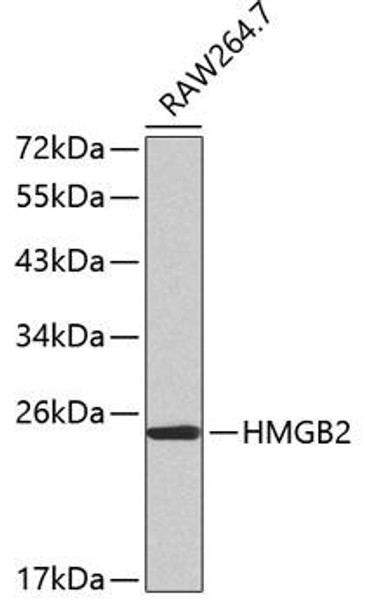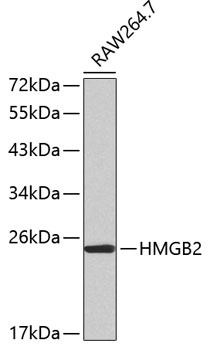Anti-HMGB2 Antibody (CAB2973)
- SKU:
- CAB2973
- Product type:
- Antibody
- Reactivity:
- Human
- Reactivity:
- Mouse
- Reactivity:
- Rat
- Host Species:
- Rabbit
- Isotype:
- IgG
- Research Area:
- Cell Biology
Description
| 抗体名: | Anti-HMGB2 Antibody |
| 抗体コード: | CAB2973 |
| 抗体サイズ: | 20uL, 50uL, 100uL |
| 申し込み: | WB IF |
| 反応性: | Human, Mouse, Rat |
| 宿主種: | Rabbit |
| 免疫原: | A synthetic peptide of human HMGB2 |
| 申し込み: | WB IF |
| 推奨希釈: | WB 1:500 - 1:2000 IF 1:50 - 1:200 |
| 反応性: | Human, Mouse, Rat |
| ポジティブサンプル: | RAW264.7 |
| 免疫原: | A synthetic peptide of human HMGB2 |
| 精製方法: | Affinity purification |
| ストレージバッファ: | Store at -20'C. Avoid freeze / thaw cycles. Buffer: PBS with 0.02% sodium azide, 50% glycerol, pH7.3. |
| アイソタイプ: | IgG |
| 順序: | Email for sequence |
| 遺伝子ID: | 3148 |
| Uniprot: | P26583 |
| セルラーロケーション: | Chromosome, Cytoplasm, Nucleus, Secreted |
| 計算された分子量: | 24kDa |
| 観察された分子量: | 24kDa |
| 同義語: | HMGB2, HMG2 |
| バックグラウンド: | This gene encodes a member of the non-histone chromosomal high mobility group protein family. The proteins of this family are chromatin-associated and ubiquitously distributed in the nucleus of higher eukaryotic cells. In vitro studies have demonstrated that this protein is able to efficiently bend DNA and form DNA circles. These studies suggest a role in facilitating cooperative interactions between cis-acting proteins by promoting DNA flexibility. This protein was also reported to be involved in the final ligation step in DNA end-joining processes of DNA double-strand breaks repair and V(D)J recombination. |
| UniProt Protein Function: | HMGB2: DNA binding proteins that associates with chromatin and has the ability to bend DNA. Binds preferentially single-stranded DNA. Involved in V(D)J recombination by acting as a cofactor of the RAG complex. Acts by stimulating cleavage and RAG protein binding at the 23 bp spacer of conserved recombination signal sequences (RSS). Belongs to the HMGB family. |
| UniProt Protein Details: | Protein type:Nuclear receptor co-regulator; DNA-binding Chromosomal Location of Human Ortholog: 4q31 Cellular Component: nucleoplasm; extracellular space; protein complex; perinuclear region of cytoplasm; cytoplasm; condensed chromosome; nucleus Molecular Function:protein domain specific binding; protein binding; RAGE receptor binding; DNA binding; double-stranded DNA binding; damaged DNA binding; chromatin binding; transcription factor activity; DNA bending activity; single-stranded DNA binding; chemoattractant activity Biological Process: positive regulation of nuclease activity; establishment and/or maintenance of chromatin architecture; DNA topological change; V(D)J recombination; apoptosis; positive regulation of transcription, DNA-dependent; positive regulation of erythrocyte differentiation; male gonad development; spermatid nuclear differentiation; base-excision repair, DNA ligation; chromatin remodeling; regulation of transcription from RNA polymerase II promoter; nucleosome assembly; positive chemotaxis; response to steroid hormone stimulus; DNA ligation during DNA repair; positive regulation of endothelial cell proliferation; positive regulation of transcription from RNA polymerase II promoter; positive regulation of megakaryocyte differentiation; DNA fragmentation during apoptosis; negative regulation of transcription, DNA-dependent; positive regulation of DNA binding; cell structure disassembly during apoptosis |
| NCBI Summary: | This gene encodes a member of the non-histone chromosomal high mobility group protein family. The proteins of this family are chromatin-associated and ubiquitously distributed in the nucleus of higher eukaryotic cells. In vitro studies have demonstrated that this protein is able to efficiently bend DNA and form DNA circles. These studies suggest a role in facilitating cooperative interactions between cis-acting proteins by promoting DNA flexibility. This protein was also reported to be involved in the final ligation step in DNA end-joining processes of DNA double-strand breaks repair and V(D)J recombination. [provided by RefSeq, Jul 2008] |
| UniProt Code: | P26583 |
| NCBI GenInfo Identifier: | 123374 |
| NCBI Gene ID: | 3148 |
| NCBI Accession: | P26583.2 |
| UniProt Secondary Accession: | P26583,Q5U072, B2R4K8, D3DP37, |
| UniProt Related Accession: | P26583 |
| Molecular Weight: | 209 |
| NCBI Full Name: | High mobility group protein B2 |
| NCBI Synonym Full Names: | high mobility group box 2 |
| NCBI Official Symbol: | HMGB2 |
| NCBI Official Synonym Symbols: | HMG2 |
| NCBI Protein Information: | high mobility group protein B2; HMG-2; high-mobility group box 2; high mobility group protein 2; high-mobility group (nonhistone chromosomal) protein 2 |
| UniProt Protein Name: | High mobility group protein B2 |
| UniProt Synonym Protein Names: | High mobility group protein 2; HMG-2 |
| Protein Family: | High mobility group protein |
| UniProt Gene Name: | HMGB2 |
| UniProt Entry Name: | HMGB2_HUMAN |


